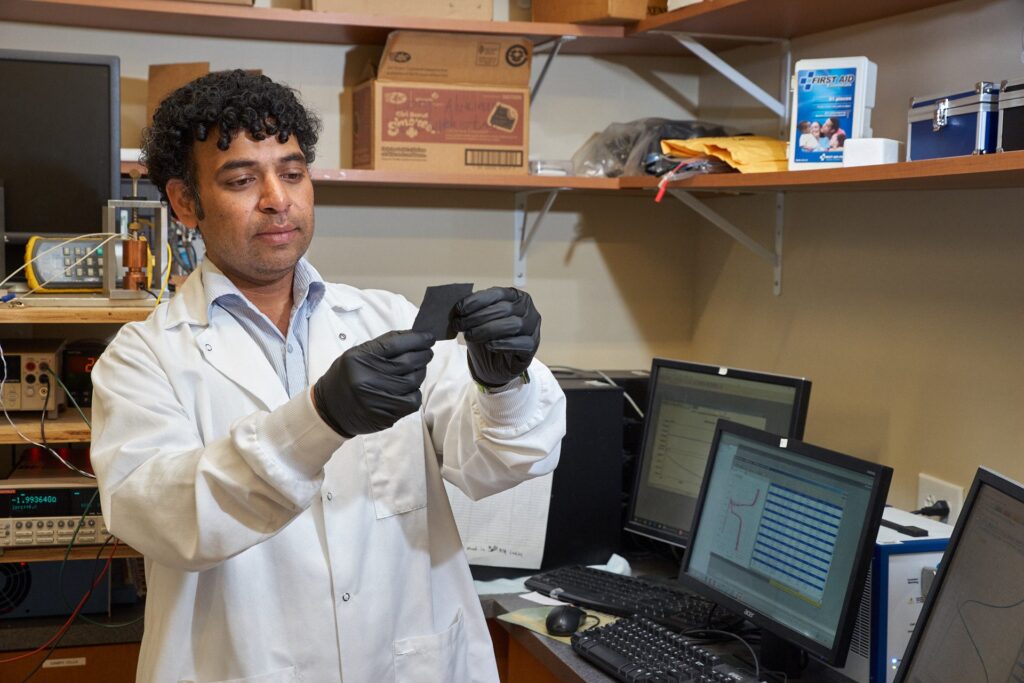
CLEMSON, S.C. – Ramakrishna Podila, a distinguished materials physicist at Clemson University, has achieved a significant career milestone by being named a Fellow of the Institute of Physics. The honor recognizes his influential contributions to modern condensed matter and applied physics.
Immediate Impact
The Institute of Physics, a prestigious professional society based in the United Kingdom and Ireland, boasts approximately 21,000 members worldwide. Podila’s election as a Fellow highlights his pivotal role in advancing the field.
“It’s an honor to be selected as a Fellow of the Institute of Physics. Having a panel of peer reviewers who you do not know and with whom you have not collaborated telling you that you are deserving, is humbling,” Podila stated.
Key Details Emerge
Podila’s research is notably interdisciplinary, integrating physics, chemistry, biology, and materials science. His groundbreaking work spans energy conversion and storage, nano-bio interfaces, and photonics and bioimaging.
Pioneering Contributions
His seminal contributions in nanoscience and nanobiophysics have led to the discovery of new phenomena in low-dimensional materials, impacting energy, health, and photonics sectors. Podila has been instrumental in developing next-generation supercapacitors and batteries and has advanced ambient energy harvesting through triboelectric nanogenerator (TENG) research.
Podila remarked, “My group’s work has been very multidisciplinary. Physics is at its core, but we venture out into different areas, like energy, health and optics. The boundaries between sciences are very blurred and not really relevant anymore.”
Expert Analysis
Podila emphasizes the transformative potential of physics in addressing non-physics problems, drawing parallels to revolutionary technologies in genetics and computing. His research group is currently exploring quantum mechanics and quantum biology foundations, with a particular focus on viral quasi-species.
What Comes Next
Podila predicts that quantum biology will become a pivotal field, potentially reshaping our understanding of virus replication and evolution. His recent paper, presented at the American Physical Society, aims to catalyze new research in this emerging area.
“Quantum biology, I think, is going to be the next big thing,” Podila said. “I hope it starts a new body of work in applying quantum to how viruses replicate and in general, that could have impact on how evolution happens.”
Background Context
Podila’s research has garnered support from leading agencies, including the National Science Foundation, National Institutes of Health, NASA, and the U.S. Army, alongside global companies. He has authored over 100 publications, with some papers ranking in the top 1% of cited articles in materials chemistry.
Timeline of Events
- 2007: Earned a master’s degree in physics from the Indian Institute of Technology, Roorkee.
- 2011: Completed Ph.D. in condensed matter physics at Clemson University.
- 2015: Joined Clemson as an assistant professor.
- 2020: Promoted to associate professor.
Podila has also been recognized with the Roaring10 Award from the Clemson Young Alumni Council and the Rising Star in Discovery Award for the College of Science. Additionally, he is a Fellow of the Royal Society of Chemistry.
Regional Implications
Podila’s achievements not only enhance Clemson University’s reputation but also underscore the region’s growing influence in cutting-edge scientific research. His work continues to inspire future generations of scientists and researchers.
As Podila and his team forge ahead, their research promises to break new ground, potentially leading to innovations that could transform industries and improve lives worldwide.






